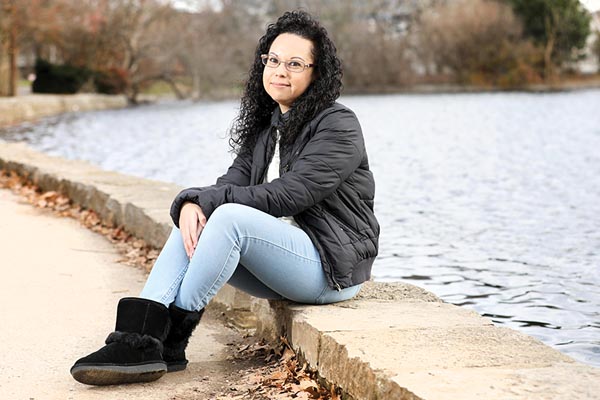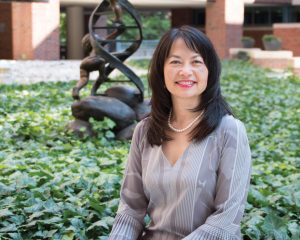Fresh Start
A better path for young adults with cancer
March 3, 2021 | Nancy Humphrey

Photo by Erin O. Smith
When Sonia Richard was diagnosed with stage 3c colorectal cancer at age 30, she felt lost.
“I didn’t know anyone my age who had dealt with cancer,” Richard said.
The Vanderbilt-Ingram Cancer Center Young Adult Program is a new initiative to help people diagnosed in the prime of their lives. It’s designed for patients ages 20-45 who face a unique set of challenges as they navigate life with cancer.
One of the first challenges they often face is getting their primary care physicians to consider the possibility of a cancer diagnosis.
Richard had been having symptoms for three years before her diagnosis.
First, she noticed a small amount of blood in her stool. Then, intermittently over the next three years, she experienced rectal pain, constipation, gastrointestinal issues and some weight loss.
But neither she nor the three doctors she sought out in California, where she lived with her husband, considered colorectal cancer as a possibility in such a young, otherwise healthy individual.
Richard knew her grandfather had died of colon cancer, but he was 70 when he was diagnosed. Colon cancer is the third most common cancer in the United States in both men and women, but the majority of cases occur in people over 50.
Only 12% of colorectal cancer cases are diagnosed in individuals younger than 50, according to the American Cancer Society (ACS). For colon cancer, the average age at the time of diagnosis for men is 68, and for women, 72. For rectal cancer, it’s 63 for both men and women.
Richard’s symptoms were chalked up to internal hemorrhoids or diet. Her blood work was mostly normal except once when her white count was elevated, and a viral stomach bug was suspected. One California physician recommended adding fiber to her diet, which helped temporarily, but the symptoms returned. Prescribed steroids didn’t help either.
Neither a rectal exam nor a colonoscopy were suggested. Regular screenings for colon cancer aren’t recommended for those at average risk until age 50 by most physicians, although in 2018, the ACS lowered their screening age recommendation to 45. And in October 2020, the U.S. Preventive Services Task Force — the nation’s leading panel for medical guidance — proposed lowering the recommended screening age for colon and rectal cancers to 45.

Cathy Eng, MD, FACP, FASCO, is the director of the Young Adult Program. Photo by Kelley Robbins.
“I fully agree it should be lowered to 45; I actually think it should be lowered to 40 because it takes 5 to 10 years for a noncancerous polyp to become cancerous,” said Vanderbilt-Ingram’s Cathy Eng, MD, FACP, FASCO, professor of Medicine, David H. Johnson Professor of Surgical and Medical Oncology, who directs the Young Adult Program.
In 2017, Richard, then 30, and her husband moved to Nashville.
“By this time, I was losing more weight. I was fatigued and I had no energy,” she said. “I didn’t look good.” She called Vanderbilt University Medical Center and got an appointment with gastroenterologist Keith Obstein, MD. He took a thorough history, and she told him about her grandfather.
“He said he wouldn’t let me leave without an answer,” Richard remembers. A colonoscopy revealed a tumor in her rectum and her colon was filled with dozens of polyps, a genetic condition called Familial adenomatous polyposis (FAP). She finally had an answer — she had colorectal cancer.
“When I woke up and heard those words, I started crying and broke down. I thought ‘I’m too young for this. I can’t deal with this. I’m out here alone with my husband and my family is 2,000 miles away,’” she said.
“I shut out what he (Obstein) was saying. I was in disbelief. I was only 30, and everything I read online indicated that colon cancer is an older person’s disease, that I didn’t even need to worry about it until I was over 50. I thought, ‘I’m 20 years younger than the recommended screening age, and I have full blown colon cancer?’”
In August 2017, under the care of Jordan Berlin, MD, at Vanderbilt-Ingram, Richard began eight rounds of chemotherapy. They ended on the day her grandfather had died of colon cancer 12 years before. In January 2018, she began radiation and continued with oral chemotherapy. In April 2018, she underwent a five and one-half hour surgery with surgeon Alexander Hawkins, MD, to remove her colon, rectum and anus. She wears a permanent ostomy bag, and has had no recurrence of cancer two and one-half years later.
Richard is one of 31 members of a multidisciplinary advisory committee for the Young Adult Program, who among other things, helped establish a website for the young population of patients, www.youngadultswithcancer.com.
The members include several young cancer patients. Richard said she would have benefited from such a program when she was diagnosed.
She needed a full-time caregiver, so her husband had to take another job that paid less so he could work from home. She had to go on disability with her job as a background investigator, receiving less pay during that time.
The stress from her illness and the fact that her husband’s mother died about the same time Richard was diagnosed with cancer proved to be too much for their marriage. After seven years of marriage, they divorced a year ago.
“When I was diagnosed, I didn’t know the ins and outs,” she said, adding that she found a support club through Nashville’s Gilda’s Club. “But it would have been so helpful to have had all my resources at the same place as well as the support I needed, to not have to think about ‘where am I going to go? Who am I going to talk to?’”
A unique patient population
Faculty members joining Eng in developing the program are Elizabeth Davis, MD, assistant professor of Medicine, who specializes in the treatment of patients with bone and soft tissue sarcoma, and Michael Byrne, DO, assistant professor of Medicine, whose specialty is Hematologic Malignancies & Blood Marrow Transplant.
The Vanderbilt-Ingram Young Adult Program website contains all evidence-based information, vetted by Vanderbilt-Ingram physicians. The comprehensive program will provide supportive services for all aspects of the patients’ journey, from screening to diagnosis and support throughout treatment.
“Young adults with cancer face very different obstacles from adolescents, who are still under the care of their parents, and from the older patient population, who for the most part have already established their career and their family, or who may be retired,” said, Eng, who treats patients with colorectal cancer and also serves as co-director of GI Oncology at Vanderbilt-Ingram and co-leader of the Vanderbilt-Ingram Gastrointestinal Cancer Research Program.
“Many of these young patients might not even have a primary care physician. They are working, often in new jobs, are in new relationships or are newly married and thinking about starting a family. These patients are often dealing with issues like job security and are thinking about fertility. It’s mentally exhausting for a person to be diagnosed with cancer so young, when they’re faced with so many decisions early in life.”
Eng said the Vanderbilt-Ingram Young Adult Program is believed to be one of only three such initiatives in the country that is distinct from AYA (adolescent and young adult) programs and addresses all cancers.
“This is a unique opportunity for this institution to step up to the plate and demonstrate what is capable of being done to support our young patients, to help these individuals who have not been getting the help they need. This is very dear to my heart,” Eng said.
Julie Bulger, manager of Patient-and Family-Centered Care at Vanderbilt-Ingram, said that one of the most frightening things newly diagnosed individuals can do is to turn to Google.
“We want to make certain that’s not the case and offer a place to go to get reliable information. The members of our advisory committee have been invaluable partners in bringing this process along,” she said.
The website information is categorized by topics that affect young adults with cancer, such as: reproductive health, fertility, sexuality, body image, parenting, financial guidance and job security. Newly diagnosed young adult patients at Vanderbilt-Ingram will be directed to the website for more information. It will also include testimonials from patients and families talking about information that was helpful to them during their cancer journey.
Getting a diagnosis can be overwhelming, Bulger said, so having the information available on the website when the patient is ready and needs it is invaluable. “We don’t want to overwhelm them on their first visit and give them way more information than they can process.”
Bulger said she has learned a great deal about the unique needs of the young adult population, working with members of the advisory committee.
“Being diagnosed with cancer when you’re 65 or 75 is very different than if you’re 25 and just starting out with your goals and career. It changes everything,” she said.
“What’s great about Vanderbilt, is while we do amazing work treating the disease, we’re really committed to treating the whole person and helping them with the things that are important to them — where to find financial assistance, information about fertility, parenting, psychological stress and coping skills,” Bulger said.
“I’ve learned that every individual is different and each experience is different. There’s so much going on for each of our patients. It makes me very proud to work for Vanderbilt, that we’re taking this very focused effort to meet the needs of our young adult patients.”
Anxious and uncertain
Sarah Denger, of Nashville, is a Vanderbilt-Ingram patient and a member of the Young Adult Advisory Board. In 2014, about a year after she moved to Nashville from Lexington, Kentucky, she noticed that her lymph nodes were swollen down the left side of her neck.
“I tried to brush it off. I was brand new to a city,” said Denger, who was 23 at the time, adjusting to a new job as a social worker and contemplating going to law school. “I grew up in a place where I knew everybody and I was under a little bit of stress here, with a busy job, trying to meet new people and be active,” she said.
Without a primary care physician, she went to a walk-in clinic where they assured her she was fine.
“My bloodwork was a little wonky, but they said ‘You’re fine. You’re young. You’re healthy.’ They thought I might be dehydrated.”

Sarah Denger. Photo by Donn Jones.
Her health deteriorated. She tired easily and would get short of breath walking from her car to her office.
After several doctor’s visits, in August 2014 Denger was diagnosed with stage 4 Hodgkin’s Lymphoma. “That shook things up pretty big,” she said. She lost her job, along with her health insurance, but through the generosity of friends and family she was able to fight her cancer without extreme financial hardship.
She finished chemotherapy in February 2015, then in September 2015, at her six-month follow-up scan, a cancerous mass was found in her lungs and identified during a lung biopsy as Hodgkin’s.
She had a bone marrow transplant in March 2016 at Vanderbilt-Ingram with Byrne leading her medical team, then had another year of maintenance chemotherapy.
Today, Denger is teaching fitness classes at the YMCA, and her follow-up scans have detected no cancer. She has decided not to go to law school, and says she is still sifting through the financial burden of her cancer treatments. She values her work as a member of the Young Adult advisory committee.
“The patient perspective is so important. Cancer patients are not just pediatric or geriatric. Young adults are a demographic of cancer patients who need more age-specific resources available to them,” Denger said.
“Statistically, young adults contemplate death and mortality the least because we are fully immersed in life and career,” she said. “What’s really interesting in going through this, is the brain goes through all these processes of death, and you start feeling anxious and very uncertain about things; bitter and upset because it’s a premature time to have to start dealing with these emotions. Even as people become cancer free and start moving forward in their life, they are still contemplating these things based on their diagnosis.”
Denger said that Byrne was compassionate with a great bedside manner, but there’s a limit as to how much information your physician can provide. The Young Adult program will fill in the gaps, she said.
“Your doctor can give you the information you need about how to survive, about what’s going to happen and your hair will fall out, but there’s only so much they can do to help with ‘how am I actually going to deal with this?’”
The family perspective
Another important voice in the advisory group is that of the family member.
“The caregiver is vitally important and family members are certainly a part of who we need to be caring for. They are living with cancer, as well as the patient with cancer,” Bulger said.

Alex Waddey. Photo by Donn Jones.
Advisory Board member Alex Waddey, a Nashville attorney and commercial real estate broker, knows all too well that the entire family is devastated by a cancer diagnosis.
Waddey’s wife, Melissa, known to those who loved her as “Isse,” died after a two-year battle with colorectal cancer in December 2019 at the age of 44.
Prior to her diagnosis, Melissa was active and healthy, balancing her busy job as a health care executive with raising their three young children. “She was an extremely intelligent, kind and honest, caring person who was always looking to do something that was a passion,” Waddey said. “Her children meant the world to her. She was always keenly focused on making sure she had the appropriate work/life balance. Being a mother was of the highest importance to her,” he said.
Melissa had been having some blood in her stool off and on for about 10 years. She told both her primary care physician and her obstetrician, who said the bleeding was probably due to internal hemorrhoids, common in women who have had children.
When her symptoms worsened and she began missing work because she was having up to 20 uncontrollable bowel movements a day, she and Waddey persisted, asking for a colonoscopy. The diagnosis: stage 4 colon cancer. Surgeons removed a portion of her colon, but the cancer had metastasized to her liver.
Eng said that Melissa is the type of patient the Young Adult Program is intended to help.
“These are healthy-appearing individuals who should be at the peak of their life, but yet it’s like someone threw something at them and destroyed everything. Everything changes in a minute.”
Initially Melissa received her care elsewhere in Nashville, but when her case became more complex, she and Alex chose Vanderbilt-Ingram and Jordan Berlin, MD, as her oncologist. “We felt comfortable with his knowledge and his demeanor and the personal interactions we had with him,” Waddey said.
She had a clear scan in July 2018, but her liver enzymes were elevated. She had a liver biopsy, then additional chemotherapy as a final treatment effort. She was treated with crizotinib, a drug normally used in patients with small cell lung cancer that, based on the unique presentation of the disease, doctors thought could be effective in treating her colorectal cancer. It didn’t help. Ultimately the family stopped all treatment and Melissa died on Dec. 4, 2019.
“We held out hope in the initial stages, which was obviously important to us as a family and our ability to manage through the challenges we were facing….we have a strong faith and had faith in the medical professionals,” he said. “But it was devastating — the prospect of losing my wife who I loved dearly and was planning to spend the rest of my life with,” Waddey said.
Waddey said he is happy to lend his voice to the advisory board creating the Young Adult Program at Vanderbilt-Ingram.
“We thought because we were familiar with health care, we’d know where to turn for help, but we didn’t.”
Waddey said one of the aspects of the young adult program he is most interested in is creating awareness. “We were naïve about the signs and symptoms of colon cancer. We didn’t know her family’s health history. Isse’s grandmother passed away in her early 40s with what we thought was ovarian cancer, but it turns out it was probably colon cancer. If we had known, she would have been screened earlier and we might not be having this conversation.”
Waddey and his children are doing well, although they have ups and downs as they’ve experienced the first anniversary of Melissa’s death.
“Our kids still are still young, but Isse and I talked about them becoming young adults and going to high school and college and raising families and us being grandparents. We had an amazing 13 years of marriage and 19 years of being together, but it was a small portion of what we were hoping and expecting.”
Melissa Waddey became an advocate for colorectal cancer awareness before her death, raising funds for patient support programs and writing about her experience in a column published in The Tennessean. Alex Waddey wrote a follow-up column after her passing.
“Isse taught us all so much, lessons we can carry with us for the rest of our lives. The biggest was to take action,” he wrote.
To Learn more about the Young Adult Program, go to www.youngadultswithcancer.com
